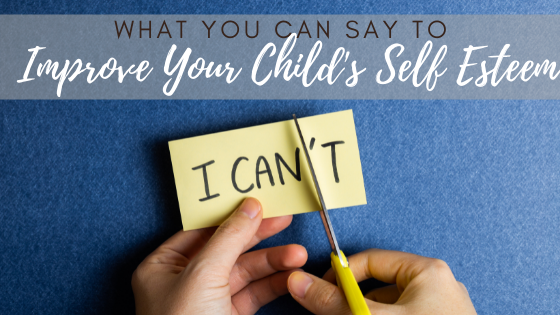
5 Things You Can Say To Improve Your Child’s Self Esteem
A healthy sense of self worth is one of the most important traits you can foster in your child. It will help define their relationships, determine their professional success and drive their mental health. What you do to improve your child’s self esteem will have life-long consequences.
It can be easy to fall into the habit of constantly praising your child in the hopes of boosting their self-worth. “You did great,” “You are the best,” and “That’s perfect” are all phrases that are easy to say but, let’s face it, they are not always the truth.
When your child struggles, constantly telling them that they are doing great isn’t the solution. Whether it’s shooting baskets or spelling words, if a child is having a hard time with a skill, they know it. Telling them that they are doing great in that circumstance teaches them that either you aren’t telling the truth or that they shouldn’t trust their own perception.
While constantly praising your child can do more harm than good, there are words and phrases you can use that build confidence. Read on for five things you can say to improve your child’s self-esteem.
What to say to improve your child’s self esteem
I’m proud of you: No matter what challenges your child is experiencing, they need to know that you are proud of them. Confidence comes from facing and overcoming obstacles and knowing that you believe in them will help them do just that.
You must be so proud of yourself: Even more important than telling children that we’re proud of them is teaching them to be proud of themselves. This will help foster not only their own sense of self-worth, but also their ability to determine their own path in life.
You worked really hard on that: Let your kids know that the effort matters and that trying hard is worth doing no matter what the outcome.
It’s okay not to be perfect: Overcoming obstacles – rather than innate ability – provides an opportunity to improve your child’s self esteem. Taking art classes, practicing a new tumbling routine or hiring a basketball coach are all ways that you can help your child improve their skills and overcome the obstacles that they are facing. If your child is struggling with reading, dyslexia therapy can help them learn new skills that will enable them to achieve better reading fluency, reading comprehension and word recognition.
I love you – no matter what: It may sound like a Hallmark card, but the reality is that your unconditional love is a key component in making your child feel safe and secure. Regularly letting them know that you love them without condition will help give them the confidence to take on the challenges that life brings.
Helping your dyslexic child with mental health challenges
Dyslexia can present a number of challenges to children’s mental health. For more information about improving your child’s self esteem if they have dyslexia, click here to learn more about Mental Healing on Demand.












